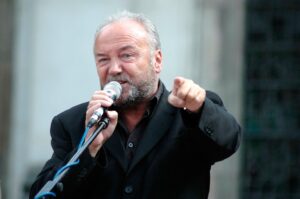Diane Abbott, Lloyd Russell-Moyle, Faiza Shaheen — within a matter of hours, all had fallen victim to the Starmerite machine. Led by campaign chief Morgan McSweeney and candidate supremo Matt Faulding, Keir Starmer’s inner circle have shown themselves to be more ruthless than any leadership team in Labour history. Jeremy Corbyn’s consiglieri were benign and amateur in comparison.
Only four years ago, when running for Labour leader, Starmer promised party members that he would be different. “The selections for Labour candidates need to be more democratic and we should end NEC impositions of candidates,” he tweeted in February 2020. “Local Party members should select their candidates for every election.” There were no caveats; his promise couldn’t have been clearer.
More than a year later, when we briefly chatted at a book launch in London, Starmer was still singing the same tune. He once again insisted that Labour would embrace greater transparency when it came to parliamentary selections. There would, he assured me, be no parachuting in of candidates “like the Milibands” — a reference to brothers David and Ed, both social advisers who were found seats before the 2001 and 2005 elections respectively. We even discussed the dangers of finding seats for some of his closest advisers — people who might make excellent cabinet ministers but could struggle to win over a local Labour Party.
Back then, I could not have predicted how ruthless and clinical those same advisers would be. On Monday and Tuesday, no fewer than seven Labour MPs announced they were standing down at the election. This sudden rush of departures was remarkable, but no coincidence.
While the number of Conservative resignations has steadily grown over the past three years, Labour’s tally has been strikingly low. In the 16 months between September 2022 and January 2024, for example, just two Labour MPs announced they were stepping aside. And yet, it was obvious to many that significantly more had made the decision to retire, but were deliberately holding back to help the party leadership. For as we saw this week, by delaying their announcement until very close to the election, they would allow the NEC to claim it’s far too late to involve party members in the selection decision. They would, as a result, have to “parachute” someone in.
Within hours of this week’s retirements, sources within Labour HQ told me who their lucky replacements would be. In each seat, the NEC went through the process of interviewing a shortlist of names — but everyone knew who they were going to pick.
So, in Makerfield, near Wigan in Lancashire, the NEC panel imposed Josh Simons, the director of the Starmerite think tank Labour Together. For Leyton and Wanstead, where John Cryer, chairman of the Parliamentary Labour Party, stood down on Monday, they chose Calvin Bailey, a former RAF squadron leader who Starmer’s team see as a future Defence Secretary. In both constituencies, the first Labour members heard of the decisions was following leaks on social media.
Such manoeuvrings, of course, have long been part of Labour’s DNA. Among friends, Tony Blair has admitted his deep regret after chaperoning duff MPs into the Lords so he could snatch their empty seats. It effectively amounted to bribery, though you wouldn’t be able to convince a court of law it happened.
Even so, in 1997, the 69-year-old Labour MP Sir Ray Powell blew the gaff on the whole process when he publicly claimed he’d been offered a peerage by a senior Labour figure to give up his seat in South Wales. At around the same time, the same deal was offered to John Gilbert, the MP for Dudley North who’d been minister in Callaghan’s government during the Seventies. But Gilbert was a tough negotiator. He insisted a peerage wasn’t enough — he wanted to be Ambassador to Washington. That was, however, a demand too far for Blair’s people, so they instead promised that Gilbert would get both a peerage and a ministerial job for two years in the new government. And just like that he became minister of state at the MoD.
What was Blair’s game-plan here? At the time, he was worried — believe it or not — that there would be too few lawyers on the Labour benches, and not enough to fill the law officer posts. So to remedy this, his old flat-mate Charlie Falconer was summoned for Dudley North. However, when he went before the NEC committee, Falconer was asked where he sent his sons to school; and when he admitted they attended distinguished private schools, Westminster and St Paul’s, his ambitions were snuffed out.
Almost three decades later, I accept of course — as I suggested to Starmer himself — that he can’t act in a wholly democratic manner. Party leaders should have some scope to get top talent into the Commons, because it’s vital that governments are formed from the best and the brightest. And it’s an unfortunate fact that some extremely able people do not get through selection processes, or have the right local connections to secure a seat in a Labour area. If that’s the case, on rare occasions the suspension of local party democracy can be justified. But you should still be open and honest about what you’re doing.
This time around, by contrast, it’s bogus to argue that Labour had no option but to impose candidates from head office on the grounds that there isn’t time for a proper form of selection. The Conservatives, after all, are still involving party members in their last-minute selections, many of which will take place this weekend. Even if the Tories’ final three-name shortlists have been influenced by CCHQ, at least they get some sort of choice.
Moreover, it’s not even as if this week’s NEC parachute operations have yielded a raft of future political geniuses. Indeed, no fewer than five of the leaked names are themselves members of the National Executive, including James Asser, chair of the NEC, who was yesterday handed West Ham and Beckton. Perhaps most revealing of all is the man chosen to stand in North Durham: Luke Akehurst, the ruthless leader of the NEC’s Right-leaning faction who has long argued that there is no room for dissent in the Parliamentary Labour Party.
What’s also interesting is how most of the parachuted candidates owe their sudden success to the NEC and Starmer’s close advisers, rather than Starmer himself. The Labour leader seems to have had little involvement apart from pushing for two Labour figures from his own Camden council. One of them, council leader Georgia Gould, is the daughter of the late Blair adviser Philip Gould and is already being tipped as a likely future cabinet minister. The other, Abdul Hai, was expected to be gifted Stratford and Bow — but amazingly, yesterday morning, McSweeney challenged Starmer by pushing instead for Uma Kumaran, a former adviser to the leader. Seen in this light, one begins to wonder how much Starmer really controls his own party — or, for that matter, how much power his advisers wield behind the scenes. Judging by the past few days, it doesn’t augur well.
Nor does this week’s operation offer an encouraging prequel to how a future Starmer government might behave. Having suddenly got the power to impose their favoured candidates, his senior advisers are handing out seats to their factional friends and NEC cronies. Indeed, they seem to be behaving like a bunch of schoolboys who have broken into the school tuck-shop and are now gorging themselves sick. And as they do, one suspects they have missed a delicious twist, 27 years on, to the aforementioned Dudley North story.
In 2022, the Labour Party in Lincoln chose as their candidate one Hamish Falconer, whose public-school education had barred his father from becoming a Labour MP. Despite this Achilles’s heel, Hamish, whose record at the Foreign Office suggests he’s brimming with talent, spent six months courting party members in the constituency. The result? He bucked the trend in selection by defeating his local rival by a margin of five-to-one. Proof, if we needed it, that often a parachute isn’t required.
Disclaimer
Some of the posts we share are controversial and we do not necessarily agree with them in the whole extend. Sometimes we agree with the content or part of it but we do not agree with the narration or language. Nevertheless we find them somehow interesting, valuable and/or informative or we share them, because we strongly believe in freedom of speech, free press and journalism. We strongly encourage you to have a critical approach to all the content, do your own research and analysis to build your own opinion.
We would be glad to have your feedback.
Source: UnHerd Read the original article here: https://unherd.com/



